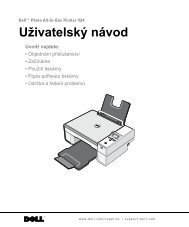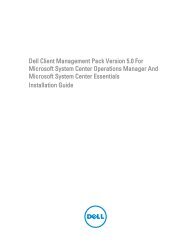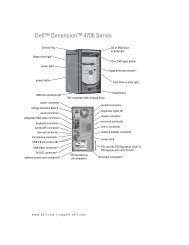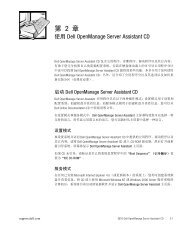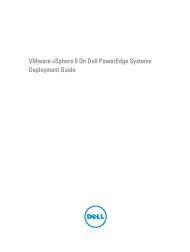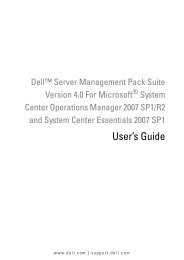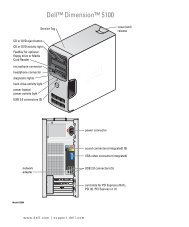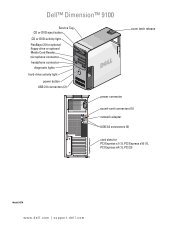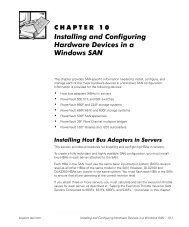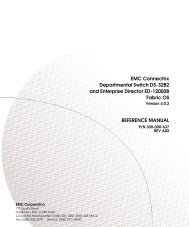Dell OpenManage Server Administrator Version 7.1 ... - Dell Support
Dell OpenManage Server Administrator Version 7.1 ... - Dell Support
Dell OpenManage Server Administrator Version 7.1 ... - Dell Support
You also want an ePaper? Increase the reach of your titles
YUMPU automatically turns print PDFs into web optimized ePapers that Google loves.
<strong>Server</strong> <strong>Administrator</strong> detects that the device driver you copied to the /var/omsa/dks/ directory supports the<br />
running kernel and uses that device driver.<br />
OpenIPMI Device Driver<br />
The <strong>Server</strong> Instrumentation feature of <strong>Server</strong> <strong>Administrator</strong> requires the OpenIPMI device driver that provides IPMIbased<br />
information and functionality.<br />
All supported Linux systems contain the required version of IPMI module in the default kernel itself. You do not have to<br />
install the IPMI RPM. For more information on supported systems, see the <strong>Dell</strong> Systems Software <strong>Support</strong> Matrix<br />
available at support.dell.com/manuals.<br />
Degradation of Functionality When the <strong>Server</strong> <strong>Administrator</strong> Instrumentation Service is<br />
Started<br />
After <strong>Server</strong> <strong>Administrator</strong> is installed, the <strong>Server</strong> <strong>Administrator</strong> Instrumentation Service performs a run‑time check of<br />
the OpenIPMI device driver whenever it is started. The <strong>Server</strong> <strong>Administrator</strong> Instrumentation Service is started<br />
whenever you run either the srvadmin-services.sh start or srvadmin‑services.sh restart commands, or when you restart<br />
the system (during which the <strong>Server</strong> <strong>Administrator</strong> Instrumentation Service is started.)<br />
<strong>Server</strong> <strong>Administrator</strong> installation blocks the installation of <strong>Server</strong> <strong>Administrator</strong> packages if an appropriate version of the<br />
OpenIPMI device driver is not currently installed on the system. However, it is still possible, though not typical, that you<br />
can uninstall or replace a sufficient version of the OpenIPMI device driver after <strong>Server</strong> <strong>Administrator</strong> has been installed.<br />
<strong>Server</strong> <strong>Administrator</strong> cannot prevent this.<br />
To account for a user uninstalling or replacing a sufficient version of the OpenIPMI device driver after <strong>Server</strong><br />
<strong>Administrator</strong> has been installed, the <strong>Server</strong> <strong>Administrator</strong> Instrumentation Service checks the OpenIPMI device driver<br />
version whenever it is started. If a sufficient version of the OpenIPMI device driver is not found, the <strong>Server</strong> <strong>Administrator</strong><br />
Instrumentation Service degrades itself so that it does not provide any of the IPMI-based information or functionality.<br />
Primarily, this means that it does not provide any probe data (for example, fans, temperatures, and voltage probe data.)<br />
Installing Managed System Software<br />
This section explains how to install managed system software using the following installation options:<br />
• Using the srvadmin-install.sh shell script<br />
NOTE: If you have downloaded the managed system software installer (available as a .tar.gz file) from<br />
support.dell.com, the srvadmin-install.sh shell script is present as setup.sh in the root directory.<br />
• Using the RPM command<br />
Related Links:<br />
Deployment Scenarios for <strong>Server</strong> <strong>Administrator</strong><br />
Prerequisites for Installing Managed System Software<br />
The prerequisites are:<br />
46<br />
• Log in as root.<br />
• The running kernel must have loadable module support enabled.<br />
• The /opt directory must have at least 250 MB of free space, and the /tmp, /etc, and /var directories must each<br />
have at least 20 MB of free space.




